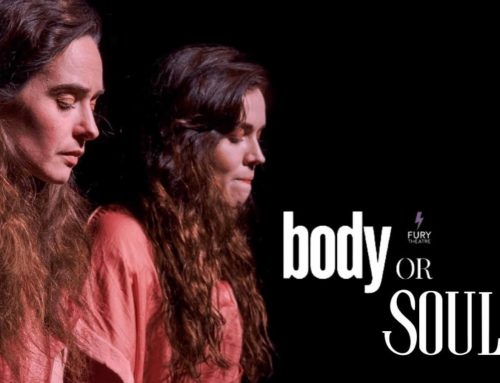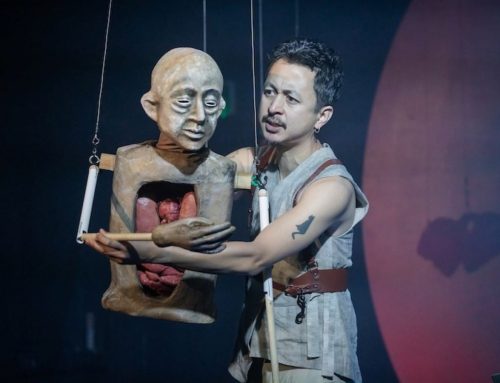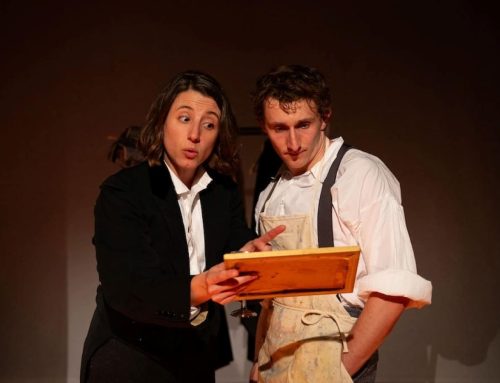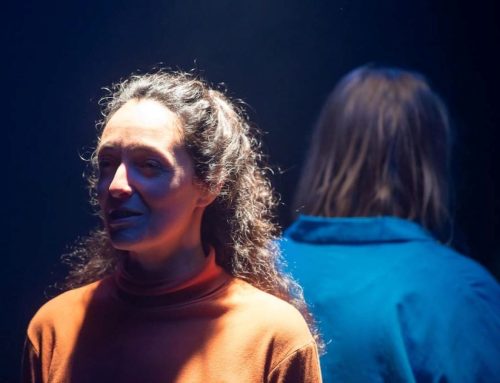The ninth annual 96 Festival, Omnibus Theatre’s month-long “celebration of queerness and theatre” kicks off with Joe Carstairs, a verbose, polemical “fusion of movement, words and music”. Set across two timelines the piece wraps itself up in navel-gazing knots attempting to find parallels between current gender politics and the life story of a 20th century “queer icon”. Meat and drink to a queer studies class perhaps but theatrically speaking this is awfully heavy going. At times Joe Carstairs comes close to collapsing under the weight of its characters seemingly unappeasable existential dread.
Marion Barbara “Joe” Carstairs’ (Rhiannon Bell) life is certainly ripe for a decent bioplay. This is not that play. Born in 1900 to a wealthy alcoholic, drug-using mother Joe grows up thinking of herself as a boy. In later life she inherits a vast fortune, dresses as a man, festoons her body with tattoos, and loves machines as much as she loves women. Her abundant female conquests and dalliances include Greta Garbo, Marlene Dietrich, Tallulah Bankhead, and Oscar Wilde’s niece Dolly.
Generous towards friends, Joe spends her twenties funding speedboat races and attending shady parties with various “intermediates, inverts, and perverts”. In her 30s she uses her vast fortune to bring much needed jobs and development to the Bahamas. At 75 she movies to Miami, writes poetry, and lives until 93. The historical record suggest that throughout her life Joe always refers to herself as a woman. Perhaps if she was born today Joe might be transgender, or non-binary, or gender non-conforming. Who knows. Assumptions either way are fraught with risks.
Cut to present day. Non-binary playwright Hik (Sarah Carvalho), intrigued by the apparent parallels between Joe’s life and their own struggle to find an identity they feel comfortable inhabiting, sets about dramatizing her iconic life. Hik seeks dramaturgical guidance from creative writing teacher Tee (Jazz Harbour). The couple’s mutual attraction spurs a passionate love affair. The couple move in together. Cue extended polemicising on, variously, the challenges some Gen Z people face in negotiating gender identity, the responsibility of the writer towards their historical subject – “It is not our role as playwrights to be accurate” they conclude – and the need to eschew “cis-het” relationship norms in their own interactions.
Hik, Tee (and writers Franko Figueiredo and Krysia Mansfield) soon wrap themselves up in knots trying to reconcile the contrast between what they see as Joe’s problematic aspects and their own 21st century standards of queer probity. Joe’s first world war service in France with the American Red Cross, driving ambulances to pick up and rebury allied, is labelled as “fascist”. Her service in Ireland driving for the British army is described as “imperialist”. Her purchase and economic development of the island of Whale Cay in the Bahamas is seen as “colonialist”. Perhaps solid arguments exist for these labels (wo do not hear them). But reconciling the queer icon with the fascist is a tough ask and dramatically speaking, here at least, a yawn-inducing dead end. Hik resolves the paradox (as they see it) by re-gendering Joe as “they” and declaring “the battles may have changed, the war continues”.
Two years on Hik has a hit West End show to their name called Labyrinth of Destruction. The title is a suitable metaphor for where their relationship with Tee is heading. “You love your idea of me, not the real me… let me be me!” Hik demands of their lover. Fair enough, but one cannot help thinking the quid pro quo for that request is ‘let Joe be Joe’. Leave the woman of history and queer icon in peace, some might say. Joe spends much of her later life alone. Will Hik end up the same way? One cannot help thinking only if they stop, as they put it, “forever drowning in who they are”.
Bell has the charisma and grace of a young Tilda Swinton and brings great presence to Joe. Carvalho’s naturalistic turn as Hik is assured, as is Harbour’s performance as the long-suffering Tee. Performances aside Joe Carstairs only really comes to life in its physical theatre and dance sequences, and in the songs. Despite some clunky lyrics (“I’m as puzzled as the oyster, I’m as riddled as the tide”) Catherine Warnock’s tunes, some original and some adapted from the likes of Grace Jones and the Gershwins, bring much needed light and shade. Emily Harwood’s bright costumes, handily place on racks on either side of the stage, bring colour. Joe is mostly clad in black and white, a ghostly monochrome echo of a character with whom Hik struggles, in vain, to find affinity.
Writer: Franko Figueiredo and Krysia Mansfield
Director: Selwin Hulme-Teague and Robyn Lexi
More Recent Reviews
Playfight. Soho Theatre.
Writer Julia Grogan’s breathtakingly assured debut play arrives at Soho Theatre following stellar reviews at the Edinburgh Fringe and [...]
All The Happy Things. Soho Theatre.
Naomi Denny’s three-hander comedy-drama All The Happy Things covers familiar themes within a recognisable premise. A grieving protagonist comes [...]
Telly. Bread and Roses Theatre.
The challenge with absurdist comedy is that many people do not find it funny. Laughing at the sheer weirdness [...]






